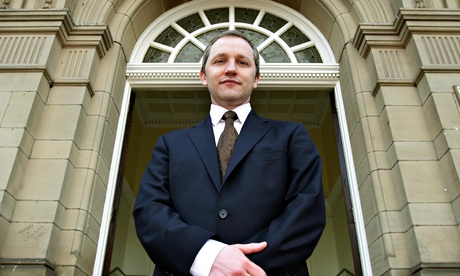
BBC strategy chief James Purnell has warned that any move to introduce subscription payments for its services would lead to "first and second class" licence fee payers and cost £500m to implement.
Purnell said moves to decriminalise non-payment of the licence fee could lead to a "lose, lose situation" with rates of evasion going up and poor households having to pay even higher fines.
The BBC's director of strategy and digital said the licence fee "isn't broken", adding that suggestions the corporation should charge for some of its services, such as the iPlayer, would "freeze the BBC in an old technological ghetto".
A BBC-commissioned "blue skies" report put forward subscription as one possible source of extra revenue if the BBC did not get the funding increase it was seeking in the next licence fee settlement.
Purnell said: "We don't think [subscription] would be simple at all. There's 40m Freeview sets out there, you would have to visit all of those. You'd have to put conditional access on them, give them subscription cards, and that would cost £500m.
"We think the overall system would be more expensive to run than the licence fee, and we think that would be significantly worse than the current system," he told the Media Show on Radio 4 on Wednesday.
Purnell, the former Labour MP and culture secretary who was one of BBC director general Tony Hall's first appointments, said subscription would mean "people paying more and getting less".
"You get into first and second class licence fee payers, you would be taking stuff away from people which they value," said. "You would only be reducing the licence fee by £10 or £20. The licence fee wouldn't be any cheaper, it would be a marginal cost."
He added: "We don't think this is the time to be changing the fundamental nature of the BBC by moving to a subscription model. We think that would mean worse, more expensive programmes."
Purnell repeated his warning that it would be a "huge risk" if the licence fee was decriminalised. Non-payment of the licence fee accounts for around 10% of all criminal prosecutions in magistrates courts.
"We don't want anyone going to prison and indeed people don't go to prison for not paying the licence fee. It's if they don't pay the fines involved with that, it's very much a last resort, about 50 people a year.
"Normally, we are told, it's when the magistrate gets frustrated that someone is wilfully not paying a whole range of fines, not just the licence fee," he said.
Purnell said it should be looked at as part of a whole range of issues around the licence fee, including extending it to people who only watch programmes on the iPlayer, not as a one-off change in the law.
"We think it would be a huge risk. If you look at something like electricity and gas, they can stop people consuming their service.
"The exam question for the BBC is, how can you make people pay for something you can't stop them consuming? If we had the same kind of evasion rates as gas or electricity, it would be twice as high as it is now, that would be £200m, nearly the whole cost of the World Service for example."
He said it could be worse for poor households under the civil system, which did not have the same discretion to adjust fines according to people's income.
"Normally what magistrates do is if you are unemployed they give you a much lower fine. If you moved to a decriminalised system, you could end up with a worse outcome for poor households and worse [level of] evasion for us. It could be a lose, lose situation."
• To contact the MediaGuardian news desk email media@theguardian.com or phone 020 3353 3857. For all other inquiries please call the main Guardian switchboard on 020 3353 2000. If you are writing a comment for publication, please mark clearly "for publication".
• To get the latest media news to your desktop or mobile, follow MediaGuardian on Twitter and Facebook.

